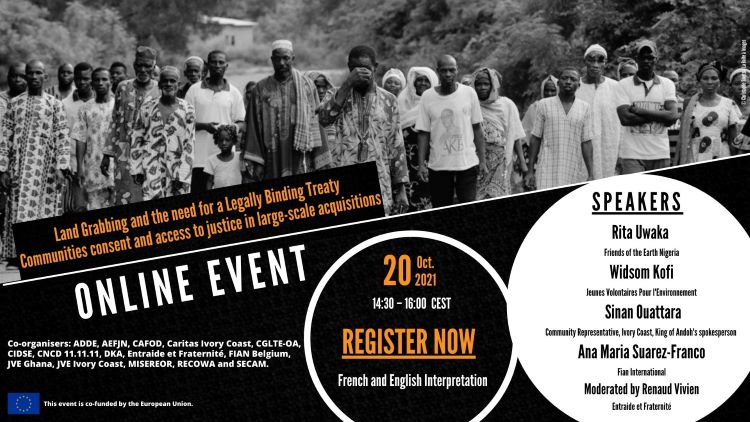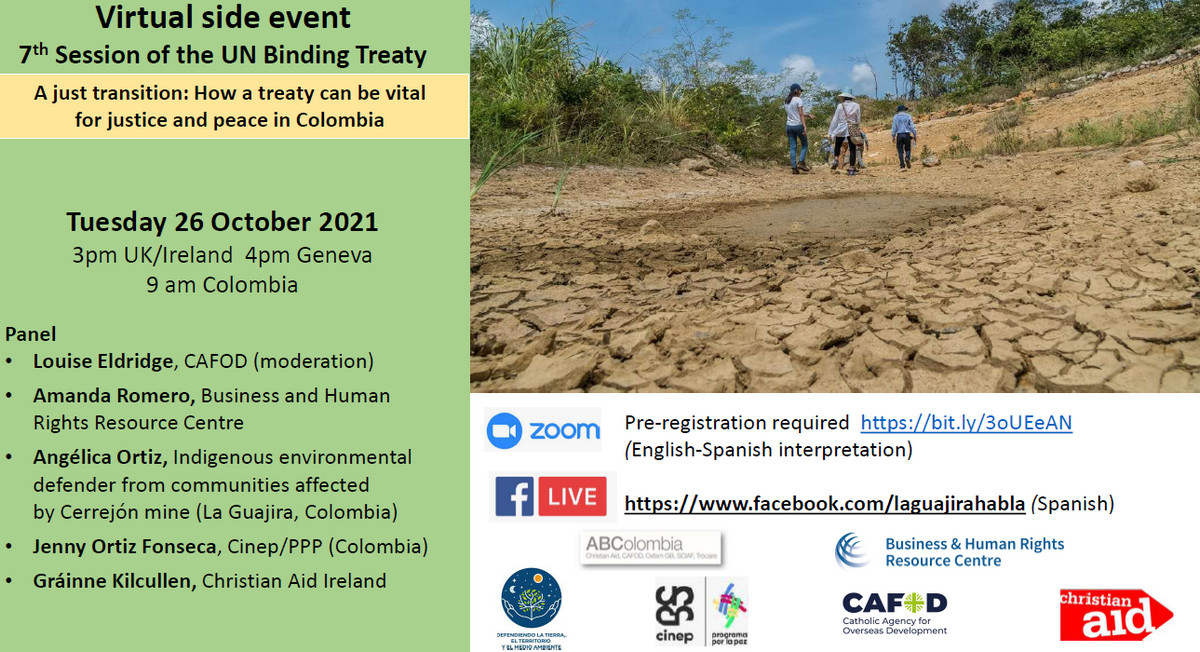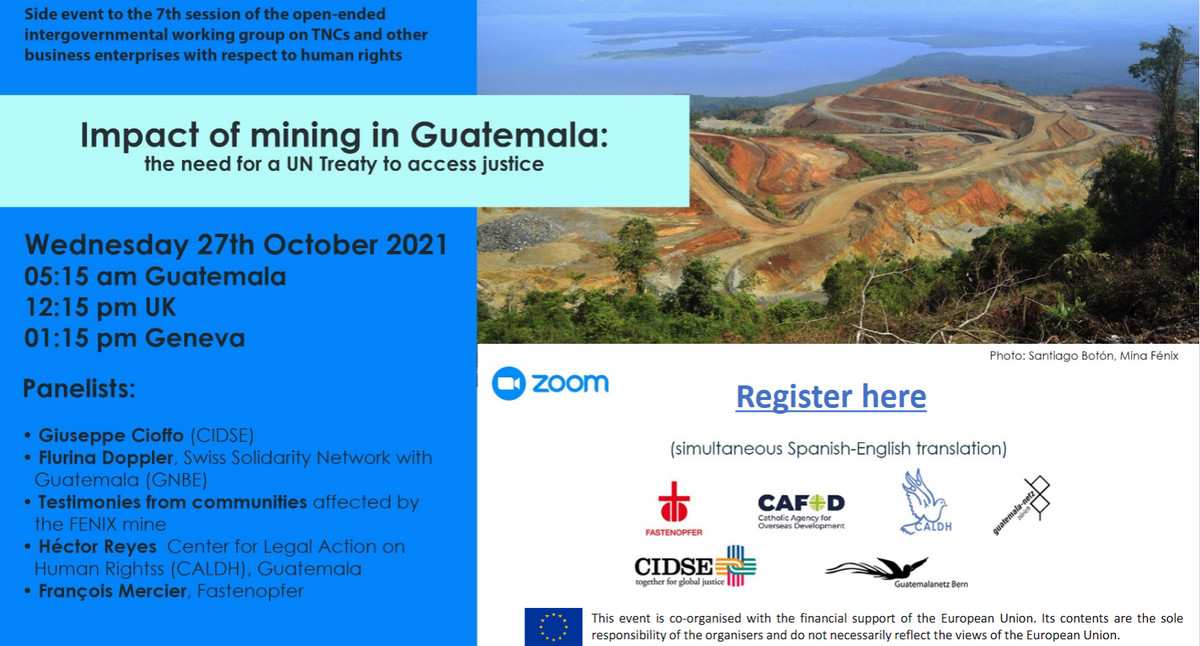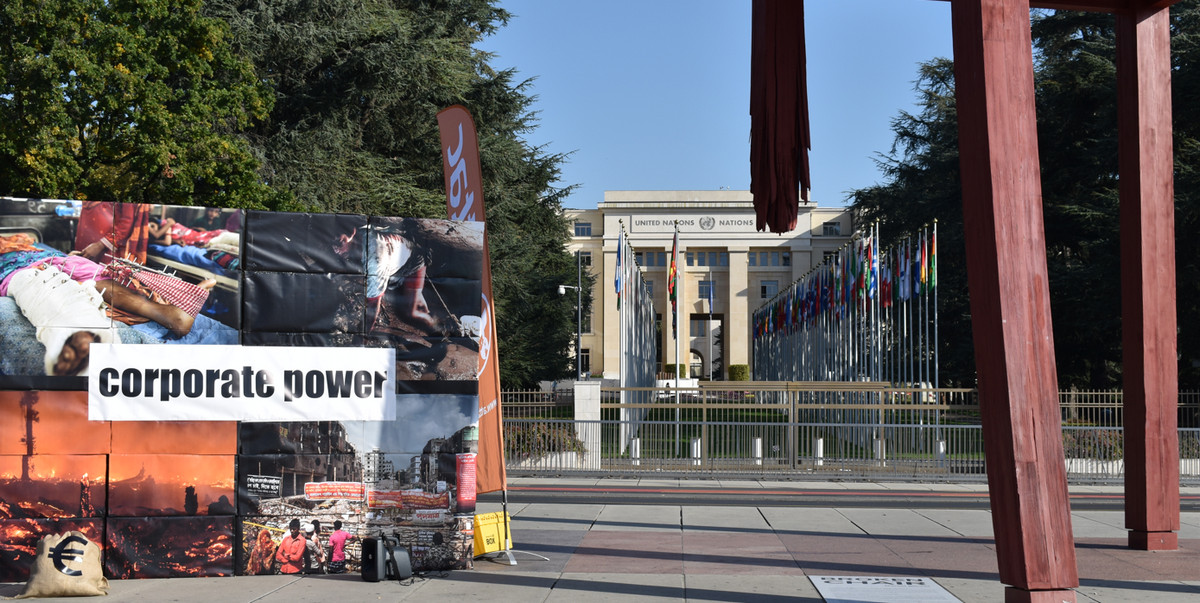As part of its commitment to advocate for human rights above corporate interests, CIDSE is closely following the negotiations for a binding Treaty on transnational corporations and other business enterprises. The open-ended intergovernmental working group on transnational corporations and other business enterprises with respect to human rights (OEIGWG), enters this year its 7th session in Geneva from 25 to 29 October 2021. For the first time since the COVID-19 pandemic, a CIDSE delegation with partner organisations will be present to lobby official delegations and join initiatives of allies such as Franciscans International and the Treaty Alliance Movement.
CIDSE PRESS RELEASE, 29 October: The EU flirts with the negotiations for a Binding Treaty on business and human rights but avoids substantial engagement, while The US attempts to derail the process
What is the status of the Treaty process?
The Permanent Mission of Ecuador, on behalf of the Chairmanship of the OEIGWG, released in August the Third Revised Draft of a legally binding instrument to regulate the activities of transnational cooperation and other business enterprises. The forthcoming session of negotiations in Geneva has been structured to stimulate direct amendments and textual suggestions to the Draft text by State Parties.
CIDSE’s Position
This year too, CIDSE is advancing the message that the Legally Binding Instrument needs to strengthen provisions allowing affected right-holders to access remedy and justice, and to protect indigenous communities, human rights and environmental defenders. The Third Revised Draft clarifies some of these points but remains too vague and unclear on others. Despite its weaknesses, CIDSE and its member organisations believe that the document constitutes a solid basis for negotiations by States.
Read:
– The CIDSE submission to the open-ended intergovernmental working group on transnational corporations and other business enterprises with respect to human rights
– The Legal Analysis of the Third Revised Draft by Prof Dr. Markus Krajewski published by CIDSE
– Global solutions to global problems: Why EU legislation and a UN instrument on corporate accountability must be complementary”. A policy briefing by CIDSE, ECCJ, ECCHR, FIDH and Friends of the Earth-Europe
The EU in the UN Negotiations
The current status of the text is the result of years of negotiations including States and civil society organisations. This year again, the voice of the European Union remains mostly absent from the negotiations. The reasons given remain the same as previous years: the ongoing domestic process of adopting a European law on Sustainable Corporate Governance, and the lack of mandate from the Council allowing the European Commission to participate.
Member States of the European Union are repeating this argument to limit their participation. We believe the time for excuses is now over. The release of the EU Sustainable Corporate Governance Directive now being expected for the end of 2021, the European Commission and Member States should seriously take their responsibility to protect and fulfil human rights and engage in the negotiations. CIDSE and its member organisations call on them not to miss this unique opportunity to contribute ending corporate impunity and offering effective avenues to justice for affected people around the world.
Activities in Geneva by CIDSE, its members, allies and partners
CIDSE statements
– General oral statement, 25 October
– “No Steps Back: Catholic organisations denounce US attempt to derail the negotiations for a UN Treaty on transnational corporations“, 25 October
– CIDSE oral statement on Article 1, 26 October
– CIDSE oral statement on Article 4, 27 October
– CIDSE oral statement on Article 5, 27 October
– CIDSE oral statement on Article 6, 28 October
– CIDSE oral statement on Article 7, 28 October
– CIDSE oral statement on Article 8, 28 October
– CIDSE oral statement on Article 10, 29 October
– CIDSE oral statement on Article 14, 29 October
Other statements
– “The United States Must Respect the United Nations and its Intergovernmental Mandate for Drafting International Law to Protect Victims of Corporate-Related Human Rights Abuses“, Treaty Alliance statement, 21 October
– Shortcomings of the Proposal of a Simplified Framework Convention on Business and Human Rights, Treaty Alliance analysis
– Common Statement of the undersigning members of the Treaty Alliance regarding the 3rd Draft of LBI and the 7th Session of IGWG negotiations, 25 October (EN – ES – FR)
– Statement with Franciscans International, CIDSE, FIAN, WILPF, CCFD-Terre Solidaire, LHR and FIDH on Article 1, 26 October
Blogs
– UN-Abkommen zu Wirtschaft und Menschenrechten: Jährlich grüßt das Murmeltier: EU verweigert Teilnahme an UN-Verhandlungen by Armin Paasch, Misereor
Side events
-> “A Child Rights Approach to the LBI Draft Treaty on Business and Human Rights”, 20 October, 1–2:30 pm CEST.

-> “Land Grabbing and the Need for a Legally Binding Treaty on Transnational Corporations & Other Business Enterprises”, 20 October, 2:30– 4:00 pm CEST.

-> “A just transition: how a treaty can be vital for justice and peace in Colombia“, 26 October, 3 PM UK/Ireland, 4 PM Geneva/Brussels, 9 AM Colombia.

-> “Impact of Mining in Guatemala: The Need for a UN Treaty to Access Justice”, 27 October, 1:15 pm-2:45 pm CEST (12.15 pm UK/5.15 am Guatemala).

Additional resources
- CIDSE Statement: A Decade Lost: Corporations Have Failed in policing Themselves. It is Time to Replace Voluntary Principles with Strong Laws
- CIDSE multimedia story: The crucial role of a Binding Treaty for cases like the Cerrejón, Colombia
- CAFOD: Protecting our common home: Land and environmental human rights defenders in Latin America
- CCFD-Terre Solidaire:
– Projet de traité onusien contre l’impunité des multinationales : la France et l’Union Européenne restent spectatrices discrètes d’un processus historique
– Attribution de la compétence à un tribunal judiciaire : les parlementaires sauvent l’esprit de la loi sur le devoir de vigilance !
Entraide et Fraternité: MADE IN IMPUNITY – Caoutchouc belge de Côte d’Ivoire - Trócaire/Irish Coalition for Business and Human rights: MAKE IT YOUR BUSINESS: How Ireland can ensure businesses respect human rights and the environment, policy paper – Campaign website
Video
Luisa Rodríguez Gaitán from CINEP, partner organisation in Colombia, explains how the activities of transnational corporations affect women and why a binding treaty on business and HR is needed for countries like Colombia.
This short video (FRE) by CIDSE member, Entraide et Fraternité, gives voice to community representatives in Prikro, Côte d’Ivoire who oppose large-scale rubber and oil palm plantations by the Belgian company SIAT.
Credit cover photo: CIDSE

